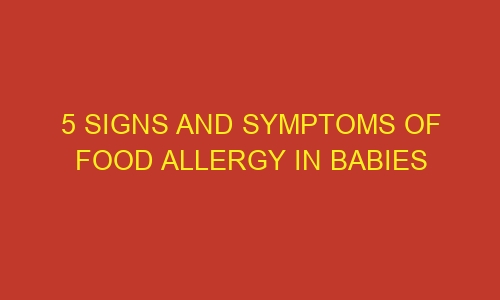Every parent knows how hard it is to raise a child. They know that what makes raising children so tough is that every child differs, and no two children are the same. Babies simply follow in their parents’ footsteps; they’re what we adults are inside of another smaller and weaker form. For healthy nutrition, you can find some great snacks for babies on organicsbestshop.com.
But there’s something even more difficult about raising a baby: food allergies! Food allergies can cause unpredictable reactions from the tiniest scratch to life-threatening anaphylaxis, leaving both parents and babies wondering when (or if) their baby will be OK again. This article discusses five signs and symptoms of food allergy in babies, as well as insight into why they occur and what you can do to help your baby thrive despite them.
- Feeding Problems
Your baby needs food to grow and thrive, so why is a baby suddenly refusing to eat? The answer is: because the baby is allergic to food. It’s not uncommon for a baby to have feeding problems, but in some cases it can be quite severe. The problem occurs because babies are unable to properly digest and absorb certain foods, or they may have an osmotic protein loss reaction (OPLR) in response to a solid food protein.
- Blood In Stool
Food allergies can cause symptoms that include blood in the stool (hematochezia), blood in the urine (hematuria), coughing or spitting up of blood, and vomiting blood. Hematochezia is the passing of red blood in the stool. Blood that is passed in the stool can be due to food allergies, a parasitic infection, or a bacterial infection.
- Vomiting And Diarrhea
Food related allergies can also cause vomiting and diarrhea. If your baby is vomiting and/or has diarrhea, it may be a sign that he or she has food allergies. The problem may only occur immediately after eating, or the reaction may occur several hours later. The symptoms of food related allergic reactions can often look like other digestive problems and diseases that cause vomiting and diarrhea, so it’s important to see your doctor if you suspect an allergy.
- Eczema
Food allergies can cause digestive issues, but don’t let that fool you into thinking that you may be able to treat the problem by simply improving your baby’s diet. Babies with food allergies are actually more likely to have eczema, which is an itchy, red, and inflamed skin rash. Babies with eczema may also suffer from anemia due to food absorption issues.
- Anaphylaxis And Asthma
A very severe allergic reaction called anaphylaxis is a risk with any kind of food allergy. Anaphylactic reactions can result in difficulty breathing (asthma), loss of consciousness, and death if not quickly treated. Because the symptoms of reactions are caused by the body’s reaction to a food, it’s important for parents to know why a reaction occurs and what can be done about it.
Eliminating or reducing allergen exposure helps reduce the risk of anaphylaxis in babies with food allergies. This can be done through avoiding cow’s milk during infancy, keeping a close eye on which foods cause reactions, learning how to administer epinephrine in case of an allergic reaction, and taking preventative measures such as having a good emergency plan and getting your child immunized against certain diseases.


0 comments